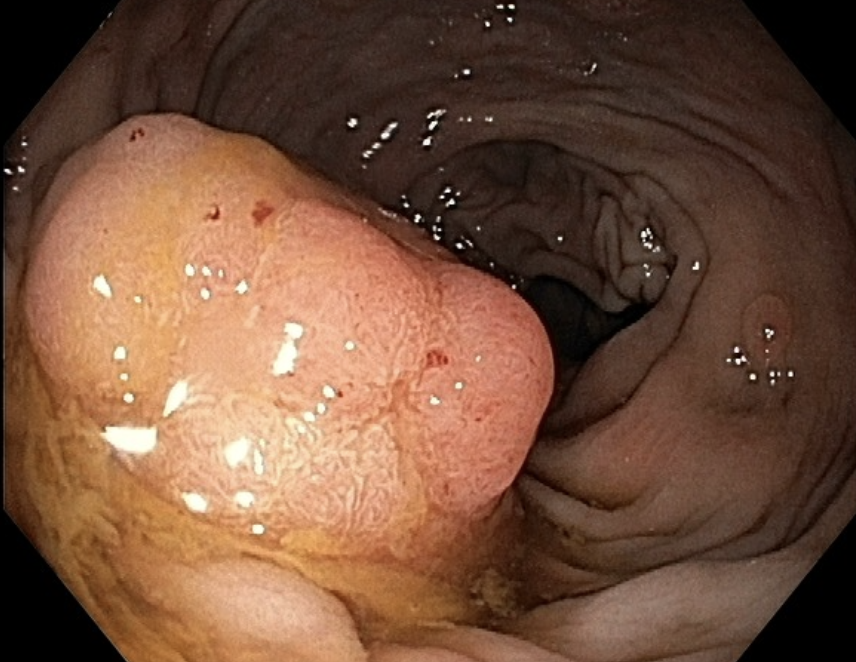Monday Poster Session
Category: Colorectal Cancer Prevention
P2676 - Colonic Polyposis After Whole Body Radiation in a Patient With Chronic Myeloid Leukemia
Monday, October 27, 2025
10:30 AM - 4:00 PM PDT
Location: Exhibit Hall

Herisha Shah, DO, MS (she/her/hers)
University of Massachusetts Chan Medical School - Baystate Health
Enfield
Presenting Author(s)
Herisha Shah, DO, MS1, Kevin Groudan, MD2, David Desilets, MD, PhD2
1University of Massachusetts Chan Medical School - Baystate Health, Enfield, CT; 2University of Massachusetts Chan Medical School-Baystate Medical Center, Springfield, MA
Introduction: Childhood exposure to abdominal or whole-body radiation is associated with increased long-term risk of gastrointestinal malignancy. The link between therapeutic radiation and the development of colonic polyposis is not clearly defined. Colonic polyposis is typically attributed to hereditary syndromes but reports of multiple adenomas in radiation-exposed individuals without germline mutations suggest a distinct radiation-associated etiology.
Case Description/
Methods: A 49-year-old male with history of chronic myeloid leukemia (CML) diagnosed in 1994, in complete remission status post remote total body radiation and bone marrow transplant (BMT), presented for his first screening colonoscopy. He had a maternal grandmother with colon cancer diagnosed at an unknown age, otherwise no family history. He had no alarm signs such as hematochezia, unintended weight loss, or anemia.
Colonoscopy revealed 22 polyps ranging in size from 4 mm to 30 mm. The polyps were completely removed by cold and hot snare polypectomy. All of the polyps were either tubular or tubulovillous adenomas, and the largest 30 mm polyp had fragments of high-grade dysplasia. A repeat colonoscopy was scheduled in 6 months.
Discussion: Survivors of childhood CML treated with total body irradiation are at increased risk of adenoma formation years after receiving treatment. Several case series report individuals with 10 to 50 adenomas that developed decades after therapy, suggesting a distinct radiation-induced polyposis phenotype. The underlying cause of this phenomenon can be radiation-induced DNA damage in the stem cells of the colonic mucosa, creating a pro-neoplastic field effect. Our patient’s first colonoscopy was not performed until more than 30 years after his treatment. As awareness for radiation-induced polyposis is increasing, initiating colonoscopy screening sooner than age 45 should be considered to prevent malignant transformation to colorectal cancer. Early recognition and proactive surveillance of radiation-induced polyposis is critical to improving outcomes in patients that have received total body irradiation.

Figure: Large polyp in sigmoid colon
Disclosures:
Herisha Shah indicated no relevant financial relationships.
Kevin Groudan indicated no relevant financial relationships.
David Desilets indicated no relevant financial relationships.
Herisha Shah, DO, MS1, Kevin Groudan, MD2, David Desilets, MD, PhD2. P2676 - Colonic Polyposis After Whole Body Radiation in a Patient With Chronic Myeloid Leukemia, ACG 2025 Annual Scientific Meeting Abstracts. Phoenix, AZ: American College of Gastroenterology.
1University of Massachusetts Chan Medical School - Baystate Health, Enfield, CT; 2University of Massachusetts Chan Medical School-Baystate Medical Center, Springfield, MA
Introduction: Childhood exposure to abdominal or whole-body radiation is associated with increased long-term risk of gastrointestinal malignancy. The link between therapeutic radiation and the development of colonic polyposis is not clearly defined. Colonic polyposis is typically attributed to hereditary syndromes but reports of multiple adenomas in radiation-exposed individuals without germline mutations suggest a distinct radiation-associated etiology.
Case Description/
Methods: A 49-year-old male with history of chronic myeloid leukemia (CML) diagnosed in 1994, in complete remission status post remote total body radiation and bone marrow transplant (BMT), presented for his first screening colonoscopy. He had a maternal grandmother with colon cancer diagnosed at an unknown age, otherwise no family history. He had no alarm signs such as hematochezia, unintended weight loss, or anemia.
Colonoscopy revealed 22 polyps ranging in size from 4 mm to 30 mm. The polyps were completely removed by cold and hot snare polypectomy. All of the polyps were either tubular or tubulovillous adenomas, and the largest 30 mm polyp had fragments of high-grade dysplasia. A repeat colonoscopy was scheduled in 6 months.
Discussion: Survivors of childhood CML treated with total body irradiation are at increased risk of adenoma formation years after receiving treatment. Several case series report individuals with 10 to 50 adenomas that developed decades after therapy, suggesting a distinct radiation-induced polyposis phenotype. The underlying cause of this phenomenon can be radiation-induced DNA damage in the stem cells of the colonic mucosa, creating a pro-neoplastic field effect. Our patient’s first colonoscopy was not performed until more than 30 years after his treatment. As awareness for radiation-induced polyposis is increasing, initiating colonoscopy screening sooner than age 45 should be considered to prevent malignant transformation to colorectal cancer. Early recognition and proactive surveillance of radiation-induced polyposis is critical to improving outcomes in patients that have received total body irradiation.

Figure: Large polyp in sigmoid colon
Disclosures:
Herisha Shah indicated no relevant financial relationships.
Kevin Groudan indicated no relevant financial relationships.
David Desilets indicated no relevant financial relationships.
Herisha Shah, DO, MS1, Kevin Groudan, MD2, David Desilets, MD, PhD2. P2676 - Colonic Polyposis After Whole Body Radiation in a Patient With Chronic Myeloid Leukemia, ACG 2025 Annual Scientific Meeting Abstracts. Phoenix, AZ: American College of Gastroenterology.

